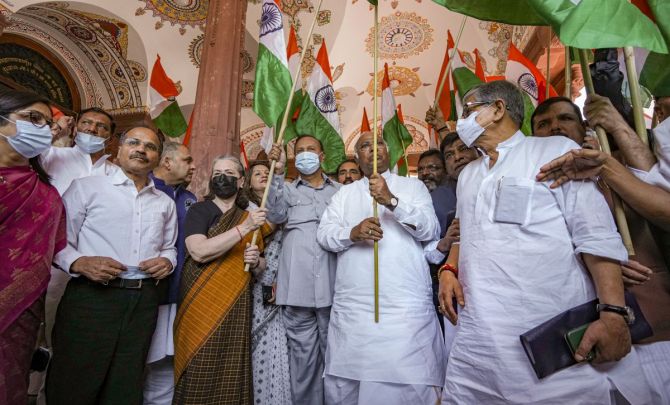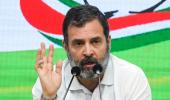One fallout of Rahul Gandhi's disqualification will be reflected in the Opposition's role in Parliament and related institutions.

With just over a year left for the general elections, the disqualification of Wayanad Member of Parliament Rahul Gandhi is almost certain to deepen the divide between the Opposition and the ruling National Democratic Alliance.
There has been a semblance of bipartisan agreement on issues of governance so far, notwithstanding tensions following the actions of presiding officers that led to the suspension of several MPs from the same party in the Upper House.
For instance, Trinamool Congress MPs were handed a sessional suspension for their role in the Rajya Sabha, but the TMC abstained from voting in the election to Vice President, leading to NDA candidate Jagdeep Dhankhar's victory by a massive margin.
But things have changed.
Sharp, pointed opposition to most -- if not all -- proposals made by the Bharatiya Janata Party is expected to be the order of the day and rule-making in Parliament, as well as the appointment of top functionaries will be the first casualty.
As Congress MP Manish Tewari -- who has repeatedly moved adjournment motions in the Lok Sabha to get the government to lay the facts before Parliament on the border skirmishes with China and has been blocked in his efforts -- told Business Standard: "It will have to be seen whether there will be any cooperation (between the government and the Opposition) at all. Or even the possibility of cooperation."
The first test of this was the election to members of the public accounts committee (PAC) on Monday, March 27.
PAC members have a one-year term; the committee is tasked with the examination of accounts showing the appropriation of sums granted by Parliament for the expenditure of the Government of India.
Reports of the Comptroller and Auditor General of India are frequently the starting point of PAC investigations.
Since the 1960s, the chairman of PAC has invariably been an Opposition leader.
The election takes place via proportional representation: 22 members are elected, with 15 from the Lok Sabha and seven from the Rajya Sabha.
This year, the election took place after Rahul's disqualification.
Few realise the extent of influence the Opposition exercises in policy-making, even in a dysfunctional Parliament.
This influence is exerted via departmental standing committees where Opposition and Treasury bench MPs scrutinise policy and laws before they become laws.
Many of these meetings are contentious like the Joint Parliamentary Committee on the draft Personal Data Protection Bill that yielded many dissent notes being attached to the final report.
The result was that the government rewrote the draft Bill in its entirety.
The functioning of committees, especially those on Bills or policy changes, also enables wider consultation.
As the consultations do not attract the anti-defection law, parties are free to take one stand in public and another in the committee.
But experts agree that the process enriches policy-making.
Cooperation between the government and the Opposition, for instance, led to a more refined version of the Consumer Protection Act, 2019, which replaced the 1986 law, and was passed only after an earlier version of the Bill was examined by the committee on food and consumer affairs.
The committee had recommended several amendments, including the increase of penalties.
Most of these were accepted by the government and incorporated into the 2019 Act.
The National Medical Commission Bill, 2017, also saw many changes after several recommendations of the standing committee on health were incorporated into the 2019 law.
There is another election due that no one in the government is discussing -- the post of the Deputy Speaker lying vacant for almost four years.
The Treasury benches have maintained there is no 'immediate requirement as Bills are being passed and discussions held' in the House.
A minister argued that 'there is a panel of nine members who can act as chairpersons to assist the Speaker'.
Says Jairam Ramesh, general secretary, Congress: "For the past four years, there has been no Deputy Speaker in the Lok Sabha. This is unconstitutional. What a far cry from March 1956 when (Jawaharlal) Nehru proposed the name of Sardar Hukam Singh, an Opposition Akali Dal MP and a critic of Nehru, for the post and he was unanimously elected."
A public interest litigation in the Supreme Court is pending.
Of the Constitutional positions that require joint consultations with the Opposition, all have been filled bar one: The office of the Lok Pal, an authority that has the power to probe charges of corruption against anyone, including the prime minister.
Since May 2022, there is only an officiating Lok Pal.
The government says the process of appointing a Lok Pal 'has begun'.
How much the Opposition will cooperate with the government in appointing a new Lok Pal remains to be seen.











